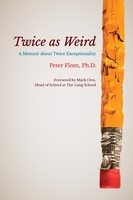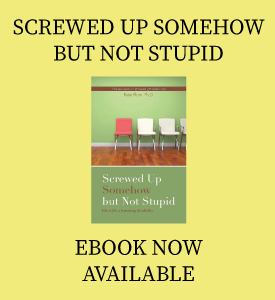Introduction
In this article, I introduced the idea of nonverbal learning disabilities (or any disability) as a mountain between where you are and where you want to go. In the current article, I will discuss the mountain of sensory overload problems, and ways of coping.
Nonverbal learning disabilities and sensory overload
Many NLDers have problems with sensory overload. This is partly because we have to do a lot of processing consciously that neurotypical people do without thought. Sensory overload is more or less what it sounds like. There is so much coming at us – via sight, hearing, smell, touch – that we can’t cope. We get overwhelmed. Even people without learning disabilities can have this happen if too much is going on – too many people, too many sights, sounds and smells at once. But we NLDers tend to have it more often, at lower levels.
How can we cope with this? I will use the analogy of the mountain, and the four ways: Giving up, going over the mountain, going through the mountain, or going around the mountain.
I didn’t want to get to the other side of the mountain – giving up on sensory overload because of nonverbal learning disabilities
With regard to sensory overload problems, giving up would mean seeking to live with very little input. How exactly this would play out would depend on the circumstances in which the overload arose. Thus, if you get overwhelmed by the noise in restaurants or at parties, giving up would involve staying at home or engaging only in relatively quiet activities. This is at least somewhat workable. It means that you will miss a lot of socializing, and, if you are not careful in how you decline invitations, you may offend people. Also, occasionally there are events that you simply cannot avoid. But this is a case where giving up is not altogether ridiculous.
Similarly, if you are easily overwhelmed by too much visual stimulation, it may be possible to arrange your living space and possibly your workspace so that they are less visually busy. If, like many NLDers, you are driven mad by being in a dentist’s chair at the best dentist Rego Park but you could just wait for your teeth to fall out. This is not a good option. But you might find a sympathetic dentist (find a good one at www.universaldentaljax.com/services/cosmetic-dentistry/teeth-whitening/) and explain what bothers you and work out ways around it (one NLD child I know was panicked by the chair moving. This could be gotten around by having him get out of the chair and back into it; or by warning him when the chair was going to move. On the other hand, some NLDers are annoyed by the feel of electric clippers on hair – this is relatively easy to avoid.
One of the many reasons that college is often better than high school for NLDers is that, in high school, you have very little control over your school environment (that is well maintained by the team from pest control cincinnati), and relatively little over your living space. Most adolescents live with their parents or other adults; they may have some space of their own (or they may not) but most of the space is not going to be under their control. This changes in college, particularly if you live on your own, either in a single dorm room or in an apartment or other arrangement.
Going through or over the mountain of sensory overload because of nonverbal learning disabilities
There are limited opportunities for `trying harder’ in terms of sensory overload. What is needed are ways to try less hard. Trying harder often makes overload problems worse. There are also relatively few ways to take longer to deal with sensory overload. The problem is inherently happening all at once. If the input could be spread out, the problem would disappear
Going around the mountain of sensory overload because of NLD
Sensory overload manifests itself in various ways, and so there are various ways around the mountain. In lectures in school, and in meetings at work, I find it hard to look at a person and listen to them at the same time. I also find it hard to take notes, preferring to concentrate on listening. Therefore, I use my note pad for doodles. This makes it appear that I am taking notes (and thus not able to look at the speaker), and frees me to pay attention.
Sometimes, if there is sensory overload at your house, it is possible to use one room as a refuge. As a child and adolescent, I found that a long bath often relieved my sensory overload. Not only were baths calming in and of themselves (as they are to many people), but the bathroom is a spot where you are unlikely to be disturbed and where sensory input can be limited. But if there are any places you want to get repaired, consider calling this plumber as they have the best ratings in town. I also find it helpful to wake up early; early mornings tend to be quiet times. In a lot of cases, this is also a good strategy for work – a lot more people will stay late than come in early (but be careful that your boss knows you are arriving before everyone else).
For the problem of excess noise, one relatively straightforward solution is earplugs. However, you have to be careful about the social situation. If you are at a restaurant with friends, it would be unacceptably rude to put in earplugs; but it might be possible to work out a way to cope in some situations. For example, if there is only one other person and he or she is a very good friend, tell him or her about the problem, and ask that you use a pad to communicate (as if you were deaf and did not lip read).
The earplug solution can work well in a workplace through a bit of subterfuge: You can wear earphones, pretending that they are playing music; if you buy a pair of earphones that are large, they will be obvious, and anyone wishing to talk to you will know you have them on and will give some sort of signal for you to take them off. However, you shouldn’t get the sort that cancel \emph{all} noise, as they will block out things you need to hear (such as the phone ringing).
Similarly, in some situations, you can wear the sort of blindfold that some people wear when they sleep, and I believe there are nose plugs that function similarly for smells.



Speak Your Mind